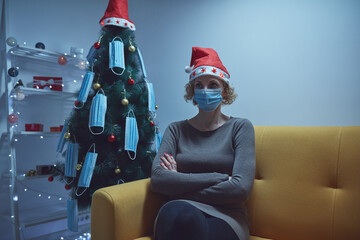
As the festive season approaches, many look forward to decking the halls and bringing home a Christmas tree. However, what if that beloved tree is the cause of your seasonal sniffles and sneezes? More than one-third of American households welcome a Christmas tree during the holidays, and if you find yourself with a runny nose and itchy eyes once the tree is up, you might be experiencing a case of "Christmas Tree Syndrome" — an allergic reaction to pine or mold.
AFC Urgent Care Dedham has created an easy to read guide to help you further understand what “Christmas Tree Syndrome” is and how to prevent it.
Symptoms of Christmas Tree Syndrome:
- Wheezing
- Coughing
- Itchy Nose
- Watery Eyes
- Fatigue
- Problems Sleeping
- Dark circles under the eyes
What Triggers Christmas Tree Syndrome?
Christmas Tree Syndrome can be triggered by both live and artificial trees, although it is more prevalent in natural trees. The symptoms may result from various factors, including the tree's scent, resin, or molds that naturally occur on Christmas Trees. A study by the State University of New York found that 70 percent of molds on live Christmas trees can lead to severe asthma attacks, fatigue, sinus congestion, and more.
Preventing Christmas Tree Syndrome:
For Live Trees:
- Wear gloves and long sleeves to avoid sap contact with your skin.
- Use a mask if you have asthma or are sensitive to dust and pollen.
- Shake or blow the tree with a leaf blower, then spray it with water before bringing it inside to remove pollen and mold.
- Allow the tree stump to dry outside for a few days to prevent mold growth.
- Families with severe allergies should consider avoiding live trees. If you choose one, leave it up for no more than a week.
For Artificial Trees:
- Store your artificial tree properly during the off-season: wrap it securely, store it in a cool, dry place, and avoid dusty environments.
- Wipe down the tree before setting it up in your home.
- Clean ornaments before decorating the tree.
- Use caution with spray snow, as aerosol chemicals can cause irritant reactions.
- Remove the Christmas tree promptly after the holidays to reduce the chances of mold spores and other allergens.
AFC Urgent Care Dedham is here for YOU!
If you suspect Christmas Tree Syndrome is affecting you, visit AFC Urgent Care Dedham at our convenient location. We can help determine whether it's your tree causing the issue or if there's a more serious underlying cause for your symptoms, such as a cold or the flu.
Our doors are open every day of the week, and we're here to accommodate most insurance plans. Whether you choose to walk in or schedule an appointment, we're just a phone call away. Take advantage of our convenient online payment system—it's a breeze to check in and check out with just a few clicks! Warm wishes for a joyful holiday season and continued well-being!


